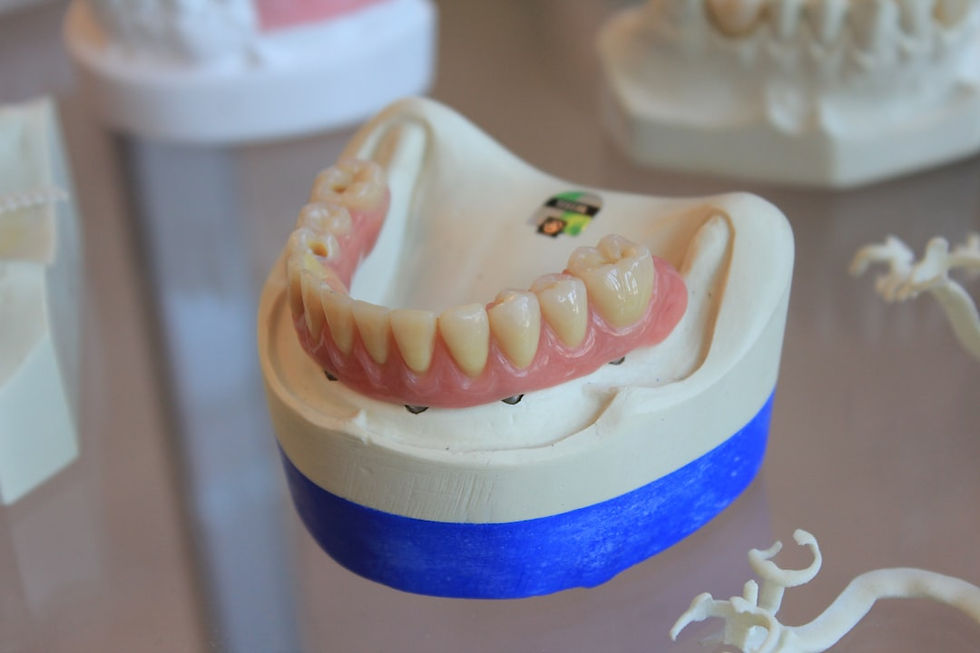The Art of Replacing Missing Teeth: A Comprehensive Guide to Toronto Dental Implants
- sarahkpkbaileyo2
- Jul 23, 2024
- 3 min read
Updated: Jul 23, 2024

When it comes to replacing missing teeth, dental implants have become a popular and effective solution for many individuals. Whether you've lost a tooth due to decay, injury, or gum disease, dental implants can help restore your smile and improve your overall oral health. In this article, we'll delve into the world of Toronto dental implants, exploring the benefits, process, and what to expect from this revolutionary treatment.
First and foremost, it's essential to understand what dental implants are. A dental implant is a small titanium post that is surgically placed into the jawbone to serve as a replacement for a missing tooth root. The implant is designed to integrate with the surrounding bone, providing a strong and stable foundation for a natural-looking crown or bridge. This innovative technology has revolutionized the field of dentistry, offering a permanent and long-lasting solution for tooth replacement.
So, what are the benefits of Toronto dental implants? For starters, they offer unparalleled durability and longevity. With proper care, dental implants can last for decades, providing a permanent solution for missing teeth. Additionally, implants are designed to mimic the natural appearance and function of real teeth, allowing you to eat, speak, and smile with confidence. Furthermore, dental implants can help prevent bone loss and preserve the natural shape of your face, reducing the appearance of wrinkles and sagging skin.
The process of receiving Toronto dental implants typically begins with a consultation with a qualified dentist. During this initial appointment, your toronto dental implants expert will assess your oral health, discuss your treatment options, and determine whether you're a suitable candidate for dental implants. If you're deemed a suitable candidate, your dentist will create a personalized treatment plan, outlining the steps necessary to achieve your desired results.
The actual procedure of placing a dental implant is typically performed under local anesthesia, ensuring your comfort throughout the process. The dentist will make a small incision in the gum tissue, exposing the underlying bone. The titanium post is then carefully placed into the jawbone, where it will integrate with the surrounding tissue over the next few months. Once the implant has fully integrated, a custom-made crown or bridge is attached, completing the restoration process. Learn more about the best dental implants on these blogs.
In addition to the benefits and process of Toronto dental implants, it's essential to understand the importance of proper care and maintenance. Just like natural teeth, dental implants require regular brushing, flossing, and dental check-ups to ensure their longevity. By following a consistent oral hygiene routine and attending regular dental appointments, you can help extend the life of your dental implant and maintain optimal oral health.
While dental implants are an excellent solution for many individuals, they may not be suitable for everyone. Certain medical conditions, such as gum disease or bone loss, may make it difficult to receive dental implants. Additionally, individuals with a history of smoking or heavy drinking may be at a higher risk for implant failure. It's essential to discuss your individual circumstances with your dentist to determine whether dental implants are the right choice for you.
In conclusion, Toronto dental implants offer a revolutionary solution for replacing missing teeth. With their unparalleled durability, natural appearance, and ability to preserve bone loss, dental implants have become a popular choice for many individuals. By understanding the benefits, process, and importance of proper care and maintenance, you can achieve a confident and healthy smile that will last for years to come. If you're considering dental implants, consult with a qualified dentist to determine whether this treatment is right for you. For better understanding of this topic, please click here: https://en.wikipedia.org/wiki/Dental_prosthesis.


Comments